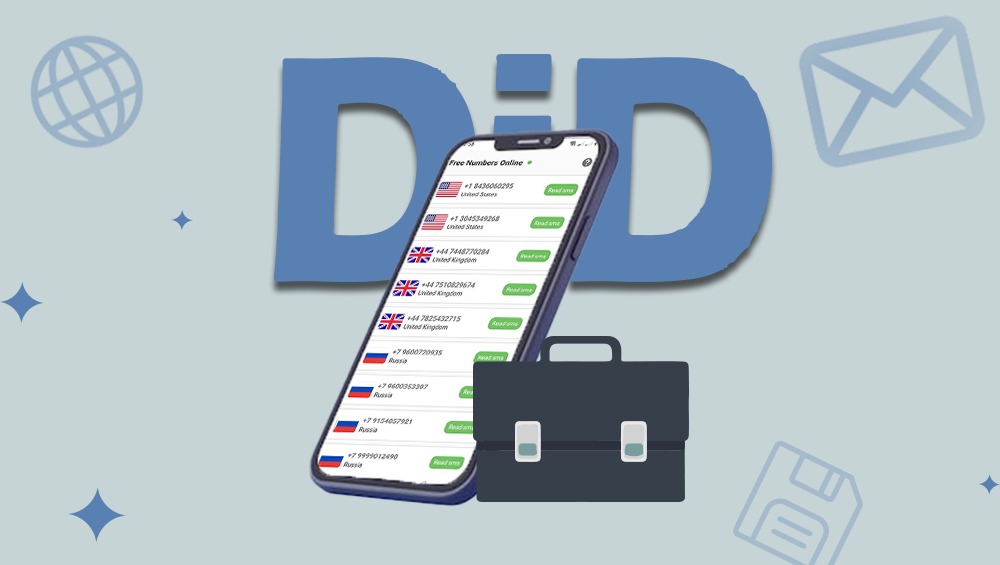In the ever-evolving world of business communication, the ways in which companies interact with customers and partners are continuously advancing. As traditional telephony systems give way to modern, cloud-based solutions, Business Telephony Innovations are making it easier and more efficient for organizations to manage their communication needs. One such innovation is Direct Inward Dialing (DID), a technology that enables companies to assign unique phone numbers to individual users or departments within a larger phone system. Additionally, the use of a temporary phone number app is gaining traction as a versatile solution for maintaining privacy and flexibility in communication. This article will explore the potential of DID numbers and other emerging technologies shaping the future of business telephony.
Expanding Horizons with DID Numbers
Direct Inward Dialing (DID) numbers have become an essential part of modern business communication strategies. With DID numbers, businesses can assign a unique phone number to each employee or department, allowing for more personalized and efficient communication with clients and partners. By utilizing Expanding Horizons with DID Numbers, companies can provide a local presence in different geographic regions, enabling them to better cater to the needs of their customers.
DID numbers can also help businesses track the effectiveness of their marketing campaigns by assigning specific numbers to each campaign and monitoring the incoming calls. This way, companies can easily determine which campaigns are generating the most interest and adjust their strategies accordingly.
Business Telephony Innovations: Cloud-Based Systems
One of the most significant Business Telephony Innovations in recent years has been the rise of cloud-based telephony systems. These systems offer a range of advantages over traditional on-premises systems, including scalability, flexibility, and cost savings. With a cloud-based system, businesses can quickly scale their communication infrastructure to accommodate growth or fluctuations in demand without the need for significant upfront investment in hardware.
Cloud-based telephony systems also offer greater flexibility, allowing employees to work from anywhere with an internet connection. This flexibility has become especially important in recent years as more companies adopt remote work policies. Additionally, cloud-based systems provide advanced features such as call recording, analytics, and integration with other business tools, helping companies streamline their communication processes.
Latest in Business Communication: AI-Driven Call Handling
Artificial intelligence (AI) is another area that is transforming the Latest in Business Communication. AI-driven call handling systems can automate routine tasks such as call routing, appointment scheduling, and customer inquiries. By automating these tasks, businesses can reduce the workload on their staff and improve the overall efficiency of their communication processes.
AI-powered chatbots and virtual assistants can also provide customers with instant support, answering common questions and directing them to the appropriate resources. These technologies can help businesses deliver a more seamless and satisfying customer experience, while also freeing up employees to focus on more complex tasks that require human intervention.
The Role of VoIP in Modern Telephony
Voice over Internet Protocol (VoIP) has been a game-changer in the world of telephony, enabling businesses to make and receive calls over the internet. VoIP technology offers several benefits, including lower call rates, improved call quality, and the ability to integrate with other communication platforms.
VoIP’s compatibility with Expanding Horizons with DID Numbers further enhances its appeal. Businesses can assign DID numbers to their VoIP lines, providing local numbers in different regions to facilitate international communication. This combination allows companies to maintain a local presence in various markets while leveraging the cost savings and advanced features of VoIP.
Unified Communications: Integrating Multiple Channels
Unified Communications (UC) is an approach that combines various communication channels—such as voice, video, chat, and email—into a single platform. This integration allows businesses to streamline their communication processes and provide a more cohesive experience for both employees and customers.
UC platforms often include Business Telephony Innovations such as presence detection, which shows users whether a colleague is available, busy, or away. This information can help improve collaboration and productivity by enabling employees to communicate more effectively.
Security and Compliance in Business Telephony
As businesses adopt new telephony technologies, ensuring the security and compliance of their communication systems becomes increasingly important. Companies must take steps to protect sensitive information and adhere to industry regulations, such as the General Data Protection Regulation (GDPR) and the Health Insurance Portability and Accountability Act (HIPAA).
Modern telephony platforms often include built-in security features such as encryption, access control, and auditing capabilities. These features help businesses safeguard their data and maintain compliance with relevant regulations. Additionally, companies can take advantage of Latest in Business Communication by implementing AI-powered security tools that detect and mitigate potential threats in real-time.
The Future of Business Telephony
The future of business telephony lies in the continued development and integration of emerging technologies such as AI, cloud computing, and IoT (Internet of Things). As these technologies mature, they will enable businesses to offer more personalized and efficient communication experiences to their customers.
For example, AI-driven sentiment analysis can provide insights into customer interactions, helping businesses tailor their responses and improve customer satisfaction. IoT-enabled devices can enhance collaboration and productivity by seamlessly connecting people and information across various channels.
In the coming years, Expanding Horizons with DID Numbers will become even more vital as businesses seek to establish a local presence in new markets. By leveraging DID numbers and other modern telephony solutions, companies can stay ahead of the competition and provide exceptional service to their customers.
Conclusion
Innovations in business telephony are reshaping the way companies communicate with customers and partners. From cloud-based systems and VoIP to AI-driven call handling and unified communications, businesses have a wealth of tools at their disposal to enhance their telephony infrastructure. By adopting Business Telephony Innovations, such as DID numbers and beyond, companies can improve their efficiency, reduce costs, and deliver superior customer experiences. As technology continues to evolve, staying informed about the Latest in Business Communication will be essential for businesses to remain competitive in the global marketplace.
